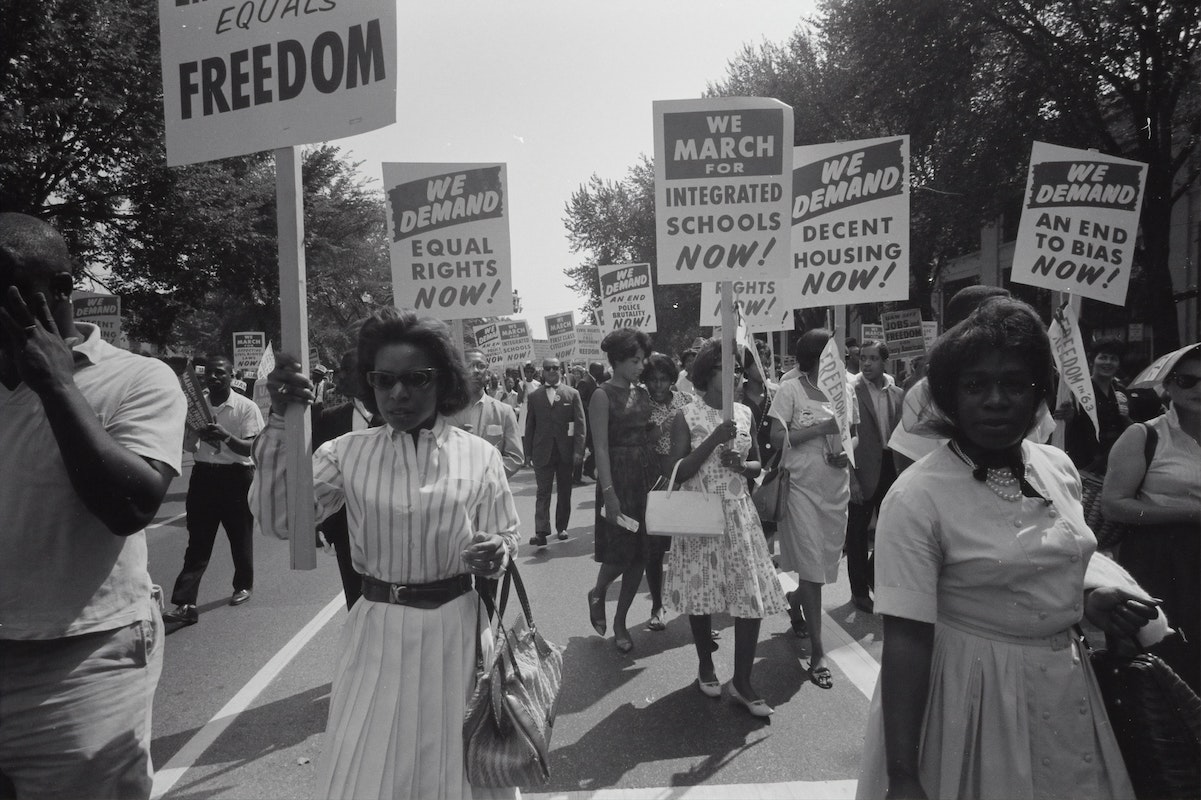Reading Lists
7 Novels About Women Fighting Against Racism and Classism
Nyani Nkrumah, author of "Wade in the Water," recommends stories about women overcoming injustice throughout history

The legacy of race and class constructs can be seen in access to education, health, jobs, and more. Race and class can intersect and compound discrimination by the mere fact that racial discrimination affects the distribution of wealth and other resources, which leads to social stratification.
Set in 1980s Mississippi, my novel, Wade in the Water, examines the generational legacy of racism in two different families, one black and one white, within the story of an unlikely friendship that develops between a mistreated and precocious eleven-year-old girl, Ella, and Katherine St. James, a mysterious white graduate research student from Princeton. Katherine’s arrival in the black side of the still racially divided town draws suspicion, but the two embark on a friendship that drowns out the outside world- until it doesn’t, and the relationship grows more fraught as Ella unwittingly pushes against Katherine’s carefully constructed boundaries that guard secrets and a complicated past.
Here are some other diverse fiction novels that tackle the impact of racial and class injustice, told from a female perspective.
The Henna Artist by Alka Joshi
The Henna Artist is a poignant, beautifully written tale of two sisters, 13-year-old Radha and her sister, 30-year-old Lakshmi. Radha, often called “Bad Luck Girl” in her rural community goes in search of her long-lost sister Lakshmi after the death of her parents. Lakshmi has been gone for 13 years, having fled a bad marriage and now has a relatively stable job as a Henna artist in the city of Jaipur. She has saved up for a house and dreams of inviting her parents to live with her. Radha’s unexpected arrival has life-altering consequences, even as Lakshmi has to bear the responsibility, and challenge, of looking after Radha. The novel explores dimensions of caste, feminism, class, and cultural expectations, capturing the intricacies of the sisters’ relationship, rural and urban life in India, the machinations of the wealthy class, and the beauty of henna.
Liberte by Kaitlyn Greenidge
Liberte is set in Brooklyn after the Civil War, at a period in America’s history where there were both slaves and free Black people. The story focuses on the life of Cathy Sampson, a free light skinned Black woman doctor, and her much darker daughter, Libertie, who is also the story’s narrator. As a child, Libertie craves her brilliant yet elusive mother, wishing to be just like her, until she finds out that the pedestal she has put her on has cracks, and as she grows, so does the distance between them. One such crack is that Liberte does not admire the compromises her mother has had to make to achieve her successes. Her mother, blinded to the fact that medicine is not Libertie’s calling, exerts pressure for Libertie to follow her into this field. Yet the word Liberte means Freedom, and it takes on new meaning in this book—freedom from her mother’s expectations, but also, freedom to choose a different path from her mother, one that does not compromise on what it means to be Black and truly free.
The Yellow Wife by Sadeqa Johnson
The Yellow Wife is a story told through the eyes of Pheby Brown, a biracial girl born to a white plantation owner and a Black slave. Pheby is taught to read, play the piano and lives a relatively privileged life. However, she longs to be free and awaits her father, who promises to free her when she is 18. However, her father dies, and Pheby is pulled into the harsh realities of a life that she had not reckoned with. The author unveils the complex plantation hierarchy and the harsh realities faced by slaves, as well as the lengths Pheby will go to to protect her children. Pheby is a fictional character inspired by Mary Lumpkin, an enslaved concubine of Robert Lumpkin a white slave owner who was heavily involved in slavery.
The Night Watchman by Louise Erdrich
The Night Watchman is set on a Native American reservation in North Dakota and follows the lives of several characters. Thomas (whose character embodies the author’s grandfather) works as a night watchman, and is engaged in a fight against Congress to emancipate the Turtle Mountain Chippewa, emancipation being a fancy word for removing the reservation land from the Indians. Embedded in this retelling of this aspect of Chippewa history is also the fictional story of the life of 19 year-old Patrice, whose goal is to get off the reservation to search for her sister Vera who left home years earlier. The author weaves a compelling story about the fight against loss of land, and self, within the backdrop of the hard life on the reservation, the intricacies of the Native American cultures and beliefs, the pull of alcohol, and the hope of something much better to come.
The Secrets Between Us by Thrifty Umrigar
The Secrets Between Us (a sequel to The Space Between Us) tells the story of Bhima, a slum-dwelling Dalit servant working in a rich Mumbai household who, without a job, must find some way to support herself and her 17-year-old granddaughter, Maya. The other Dalit main character in the novel, Parvati, sleeps in a doorway, and makes enough food for each day by selling fruit that has seen better days. There are glimpses into how the wealthy half live, seen through her former employer’s daughter and through Bhima’s new employers, who become a new lifeline. Despite occasional help from the new employers, Bhima cannot make ends meet and decides to go into business with Parvati selling in the markets of Mumbai. The novel unveils the desperation behind poverty and explores the plight of India’s untouchable caste and lower-class underbelly.
Memphis by Tara M. Stringfellow
Memphis follows the lives of ten-year-old Joan, her sister and her mother, and weaves an empowering tale across 3 generations of Black women through their tragedy, poverty, sorrows, domestic violence and injustices. The story moves through time, from the family’s flight to Memphis to escape their violent father to their lives in their new city and beyond. Over the 70-year arc of the story, we see important points in history such as the civil rights movement and 9/11 and begin to understand what lies beneath the strength and persistence of Black womanhood. It is a story of heartache, choices, perseverance, and pain, and ultimately of strength and resilience, told through unforgettable voices.
The Invention of Wings by Sue Monk Kidd
The Invention of Wings is set in the early 1800s and follows, over several decades, the lives of Sarah Grimkle and Handful, the slave girl who becomes her personal maid. We learn about slavery and resistance through the lives of Hetty and her mother Charlotte who boldly and cunningly outwits her slave masters through their own brand of resistance while Sarah grows up with an innate sense that slavery is wrong. The novel follows the growing pains of both girls, their complex relationship, and ultimately, their blossoming into who they are meant to be. For Sarah this means becoming one of the early abolitionists and champion of the women’s rights movement, and for Handful this means becoming a key part of the slave resistance movement. This is a story about the powerless, and their journey towards empowerment, and ultimately freedom, in all its forms. It is also a re-imagined story about the real Sarah Grimkle who, with her sister Angela, spoke against slavery to lawmakers as members of the American Slavery Society.









